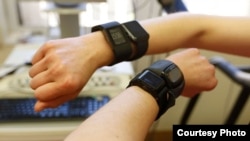It’s probably not a good idea to decide what to eat based on how many calories your wearable fitness tracker says you’ve burned, according to a new study.
Researchers at Stanford University in California, who tested several popular fitness trackers on 60 volunteers, say the fitness trackers are good for measuring heart rate and counting steps, but they’re bad at measuring energy expenditure.
The volunteers, 29 men and 31 women, engaged in a variety of physical activities, including walking or running on a treadmill or riding a stationary bike. Their heart rates were measured using a medical-grade electrocardiograph. Energy expenditure was determined by measuring the levels of oxygen and carbon dioxide in the volunteers’ breath.
Six of the seven devices tested, which included the Apple Watch, Basis Peak, Fitbit Surge, Microsoft Band, Mio Alpha 2, PulseOn and the Samsung Gear S2, did a good job measuring heart rate, coming within 5 percent of the accuracy of the electrocardiograph.
However, when it came to measuring calories burned, they did not do a very good job, with the most accurate tracker off by 27 percent. One was off by 93 percent.
“People are basing life decisions on the data provided by these devices,” said Euan Ashley, a professor of cardiovascular medicine, of genetics and of biomedical data science at Stanford, who added that consumer devices aren’t held to the same standards as medical devices.
Ashley was surprised by the results.
“The heart rate measurements performed far better than we expected,” he said. “But the energy expenditure measures were way off the mark. The magnitude of just how bad they were surprised me.”
The findings were published May 24 in the Journal of Personalized Medicine.





